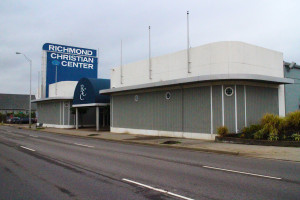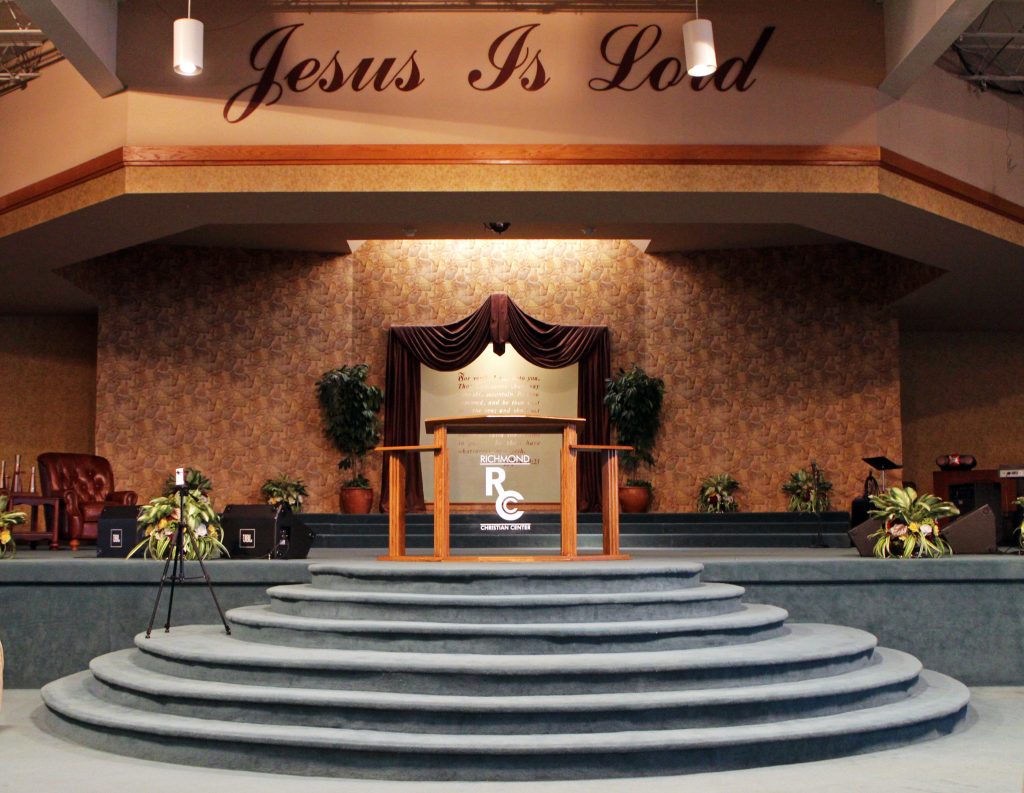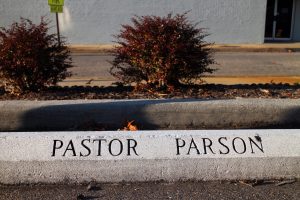A long-bankrupt Southside church can finally see the light.
Richmond Christian Center, which has toiled through bankruptcy for nearly two years, filed a reorganization plan this month that would allow it to get back in the good graces of its largest lender and emerge from Chapter 11 with a more solid footing.
Filed July 8, the 42-page document lays out a plan that will refinance the debt on RCC’s main church building near Manchester, institute steps to draw in new sources of revenue and add new leadership and procedures to better monitor its finances.
“It’s been very challenging,” said Calvin Yarbrough, one of three RCC members who are taking a greater leadership role at the church as part of the reorganization. “But it’s also very exciting because we’ve been to the depths and people are receiving it in a positive spirit.”
Specifically, the reorganization plan states that the church has negotiated a reduction and restructuring of its debt with Foundation Capital Resources, a company that specializes in lending to churches.
RCC’s dealings with Foundation Capital are what led it into the refuge of Chapter 11 beginning in 2013. The lender twice attempted to foreclose on the church’s real estate holdings, most notably its 77,000-square-foot building at 214 Cowardin Ave., after it defaulted on its loan obligations.
LeClairRyan attorney Chris Perkins, who has worked with RCC on behalf of Chapter 11 trustee Bruce Matson, said the church’s path to bankruptcy was the result of several factors.

The RCC building found a buyer at an auction last year, but the church ended up keeping the property.
“One was some mismanagement of finances that resulted in money leaving the church, putting a strain on the ability to meet its mortgage payments, and because of that, it fell into default,” Perkins said.
That mismanagement resulted in lawsuits accusing RCC founder and pastor Stephen A. Parson Sr., his sons, other family members and several business entities of using the church coffers like an ATM.
Those disputes have since been largely resolved, with Parson’s son Stephen Parson Jr. agreeing to pay money back to the bankruptcy estate and the church winning a judgement against the elder Parson.
Perkins said there was also a misunderstanding between the church and the lender over the amount of the monthly loan payments following a lucrative real estate sale, the proceeds of which the church had intended to apply to its loan balance.
The two sides have since found common ground, Perkins said. RCC defaulted on a $4.4 million loan issued in September 2005. The adjusted, agreed-upon balance is now $2.27 million, according to court records, with an interest rate of 6 percent.
“We got (Foundation Capital) very comfortable with where the church is now,” Perkins said.
The reorganization plan also calls for RCC to lease much of its unused facilities to outside tenants as a way to bring in revenue.
Lastly, church members have committed to raise $200,000 among themselves to be used to help fund the administrative costs of the reorganization. The plan is to get 400 people to put in $500, Yarbrough said.
“Some will give more, and some will give less,” he said.
The court filings related to the reorganization plan included a detailed narrative of Richmond Christian Center’s background. As told in the documents, the church was established Dec. 4, 1983 in Parson’s living room.
It grew to 100 members within the first year and more than 1,000 members in three years and was given a boost in the mid-’80s “as a result of a woman being raised from the dead.”
As told in the filings, a woman dropped dead while in the prayer line at an RCC Sunday service in 1985 and was later revived.
“This incident was certified and written up in the local papers. It also made the front page of ‘The Sun’ with the caption ‘Was it Medicine or a Miracle?’” bankruptcy filings state.
That incident and others helped build Parson and the church’s reputation, the court filings explain, resulting in a peak of more than 10,000 active members.
“Based on the size of membership, RCC was considered to be one of the first ‘Word of Faith’ Mega Churches on the East Coast,” court records state.
A core group of around 300 members has remained through the recent struggles. They include Yarbrough, Rhonda Hickman and Raymond Partridge, who as part of the reorganization, are largely charged with leading the church. They’ll also be tasked with directing the pastor in the day-to-day operations of the church going forward.
As for the future of Parson’s place at RCC, Perkins said it remains unresolved as to whether he’ll rejoin the church as its main pastor. It plans to get through the reorganization approval process and then will revisit the issue.
Parson is said to be on sabbatical. Yarbrough and others are handling the church services in the interim.
The reorganization has been preliminarily approved by a federal bankruptcy judge and will next be voted on by the church’s creditors. Perkins said ballots will be mailed to creditors by Aug. 5 and will be due back by Sept. 2 with a confirmation hearing planned for Sept. 9.
“We fully expect that we’ll get the necessary votes to confirm the plan,” Perkins said.
In a show of faith that the plan will be approved, the church said it will hold a celebration on Sept. 13 to celebrate its emergence from Chapter 11.
“We’re still here, we’re not going anywhere,” Yarbrough said. “If you want to be a part of it, come on out and visit it yourself.”
A long-bankrupt Southside church can finally see the light.
Richmond Christian Center, which has toiled through bankruptcy for nearly two years, filed a reorganization plan this month that would allow it to get back in the good graces of its largest lender and emerge from Chapter 11 with a more solid footing.
Filed July 8, the 42-page document lays out a plan that will refinance the debt on RCC’s main church building near Manchester, institute steps to draw in new sources of revenue and add new leadership and procedures to better monitor its finances.
“It’s been very challenging,” said Calvin Yarbrough, one of three RCC members who are taking a greater leadership role at the church as part of the reorganization. “But it’s also very exciting because we’ve been to the depths and people are receiving it in a positive spirit.”
Specifically, the reorganization plan states that the church has negotiated a reduction and restructuring of its debt with Foundation Capital Resources, a company that specializes in lending to churches.
RCC’s dealings with Foundation Capital are what led it into the refuge of Chapter 11 beginning in 2013. The lender twice attempted to foreclose on the church’s real estate holdings, most notably its 77,000-square-foot building at 214 Cowardin Ave., after it defaulted on its loan obligations.
LeClairRyan attorney Chris Perkins, who has worked with RCC on behalf of Chapter 11 trustee Bruce Matson, said the church’s path to bankruptcy was the result of several factors.

The RCC building found a buyer at an auction last year, but the church ended up keeping the property.
“One was some mismanagement of finances that resulted in money leaving the church, putting a strain on the ability to meet its mortgage payments, and because of that, it fell into default,” Perkins said.
That mismanagement resulted in lawsuits accusing RCC founder and pastor Stephen A. Parson Sr., his sons, other family members and several business entities of using the church coffers like an ATM.
Those disputes have since been largely resolved, with Parson’s son Stephen Parson Jr. agreeing to pay money back to the bankruptcy estate and the church winning a judgement against the elder Parson.
Perkins said there was also a misunderstanding between the church and the lender over the amount of the monthly loan payments following a lucrative real estate sale, the proceeds of which the church had intended to apply to its loan balance.
The two sides have since found common ground, Perkins said. RCC defaulted on a $4.4 million loan issued in September 2005. The adjusted, agreed-upon balance is now $2.27 million, according to court records, with an interest rate of 6 percent.
“We got (Foundation Capital) very comfortable with where the church is now,” Perkins said.
The reorganization plan also calls for RCC to lease much of its unused facilities to outside tenants as a way to bring in revenue.
Lastly, church members have committed to raise $200,000 among themselves to be used to help fund the administrative costs of the reorganization. The plan is to get 400 people to put in $500, Yarbrough said.
“Some will give more, and some will give less,” he said.
The court filings related to the reorganization plan included a detailed narrative of Richmond Christian Center’s background. As told in the documents, the church was established Dec. 4, 1983 in Parson’s living room.
It grew to 100 members within the first year and more than 1,000 members in three years and was given a boost in the mid-’80s “as a result of a woman being raised from the dead.”
As told in the filings, a woman dropped dead while in the prayer line at an RCC Sunday service in 1985 and was later revived.
“This incident was certified and written up in the local papers. It also made the front page of ‘The Sun’ with the caption ‘Was it Medicine or a Miracle?’” bankruptcy filings state.
That incident and others helped build Parson and the church’s reputation, the court filings explain, resulting in a peak of more than 10,000 active members.
“Based on the size of membership, RCC was considered to be one of the first ‘Word of Faith’ Mega Churches on the East Coast,” court records state.
A core group of around 300 members has remained through the recent struggles. They include Yarbrough, Rhonda Hickman and Raymond Partridge, who as part of the reorganization, are largely charged with leading the church. They’ll also be tasked with directing the pastor in the day-to-day operations of the church going forward.
As for the future of Parson’s place at RCC, Perkins said it remains unresolved as to whether he’ll rejoin the church as its main pastor. It plans to get through the reorganization approval process and then will revisit the issue.
Parson is said to be on sabbatical. Yarbrough and others are handling the church services in the interim.
The reorganization has been preliminarily approved by a federal bankruptcy judge and will next be voted on by the church’s creditors. Perkins said ballots will be mailed to creditors by Aug. 5 and will be due back by Sept. 2 with a confirmation hearing planned for Sept. 9.
“We fully expect that we’ll get the necessary votes to confirm the plan,” Perkins said.
In a show of faith that the plan will be approved, the church said it will hold a celebration on Sept. 13 to celebrate its emergence from Chapter 11.
“We’re still here, we’re not going anywhere,” Yarbrough said. “If you want to be a part of it, come on out and visit it yourself.”

